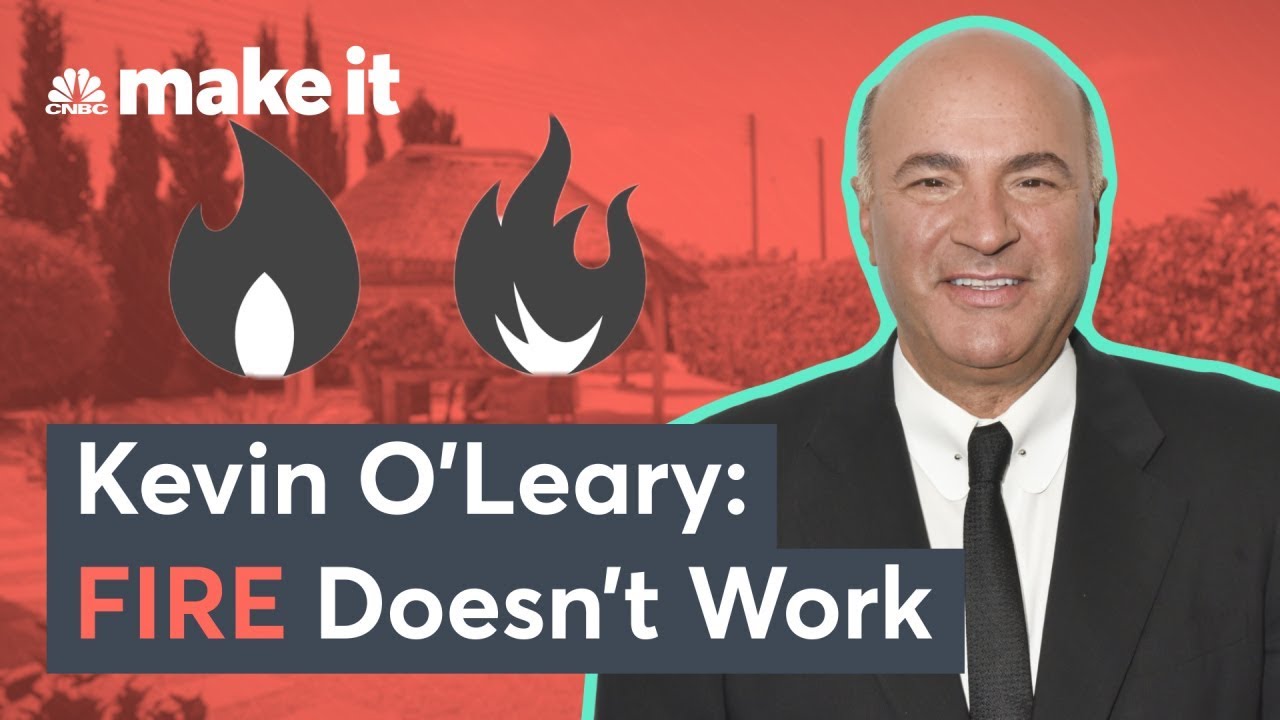
Kevin O’Leary: Why Early Retirement Doesn’t Work
Jason 0 Comments Retire Wealthy Retirement Planning Tips for Retiree's
This whole idea of financial independence retire early doesn't work. Let me tell you why. It happened to me. On the sale of my
first company, I achieved great liquidity and I
thought to myself, "Hey. I'm 36. I can retire now." I retired for three years. I was bored out of my mind. Working is not
just about money. People don't understand this very
often until they stop working.

Work defines who you are. It provides a place where
you're social with people. It gives you interaction with people
all day long in an interesting way. It even helps you live longer
and is very, very good for brain health. Staying stimulated is how people
live into their 90s. I'm not kidding. So when am I retiring? Never. Never. I don't know where I'm going
after I'm dead, but I'll be working when I get there too..
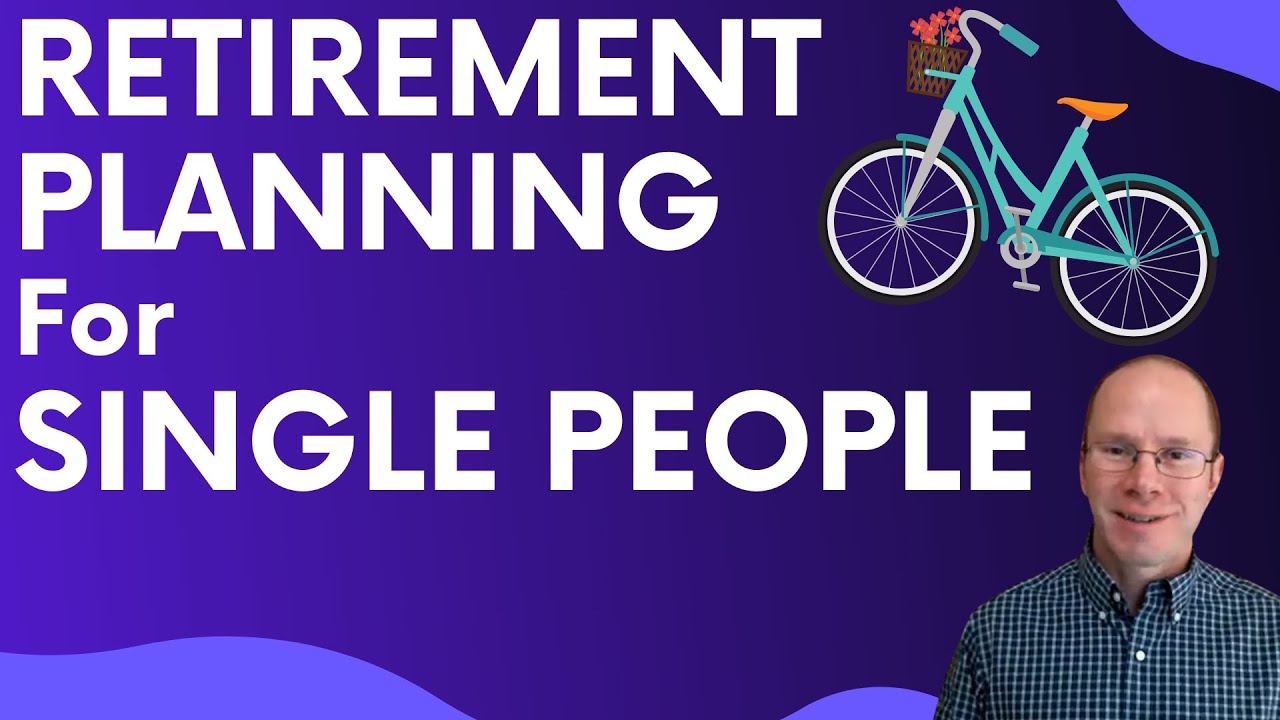
Retirement Planning for Singles
Jason 0 Comments Retire Wealthy Retirement Planning Tips for Retiree's
Retirement is a big deal for anybody, and that's especially true for single people who may be retiring with just one income and who may have built up a nest egg solely off their own savings. So, we know that single people can and do retire comfortably. In fact, one quarter of people over age 60 are living alone in their household, and that number is slightly higher for women, and that's, of course, due to women's longevity. So what we're going to talk about here is retirement for single people. First, we'll go over some averages to give you a rough idea of what the landscape looks like for single people, then we'll get into how much money you might need as you go into retirement, then we'll talk about some tips that can help improve the chances of retiring comfortably.
Let's start with the average retirement income for single people. So it's $42,000 on average for an individual in retirement, and that comes from the US Census Bureau. The median is a little bit lower at $27,000. So a friendly reminder of how this works: The median is the middle, so if you line up all of the survey results, people telling you what their income is, for example, that arrow points at the middle observation, which would give us the median down at the bottom.
But if we go to the average, that is going to get skewed by, in this case, wealthy people, for example, they have a very high income. When it comes to Social Security, the average is about $1,500 a month or $18,000 per year.Your level depends, of course on your earnings, if you had higher earnings during your working years, then you tend to potentially have a bigger benefit than that, and it could be lower, and then of course, your claiming age is also an important thing. If you claim early at age 62, you get a reduced benefit. That's likely to bring down the amount you get. Next, we have pensions, some people get an income from a job they worked at. That might be in the public sector as a teacher, a firefighter, that sort of thing, or even in the private sector, you could have a pension from your job, and those incomes just are all over the board, it could be high, it could be low, but these are different sources of income that people might have in retirement.
This is just a friendly reminder that this is just one video and it may cover some interesting information, but it's not specific to you so I hope you'll do a lot more research, hopefully check with some professionals and get some individualized advice, and that way you can improve the chances of things going well for you. So now let's talk about how much you might need as you go into retirement. Unfortunately, there's no single answer on what you need because it depends.
So the first step is to figure out what sort of income you're going to need, and I've got other videos on that, I'll put links in the description to get you some more information, but you can look at replacing a portion of your income, or you can just say, I want X amount of dollars per year, or you can go with other approaches, but first we need to know how much income you are hoping for. Next, we tally up your income sources, so that might be some guaranteed income that comes in from Social Security, for example, or from your pension at your workplace, but that forms a base of income and that might or might not cover what you need. But it gives us a base and then if we need to fill that in, we can supplement withdrawals from your retirement savings, so that might be out of your IRA, your 401, 403, these accounts that you have built up over time can provide supplemental income to help fill the gap between that guaranteed income you get and the amount you actually want to spend. There are a number of ways to figure out how much to withdraw and to set up different strategies, there might be bucking strategies, there might be withdrawal strategies like the 4% rule.
Or if you don't like that, make it the 3% rule to be safer, or take out more if you think that's not enough and you're selling yourself short. Ultimately, there are a number of ways to approach this, so you just pick one that works well for you, and again, I can point you to some resources on figuring that out. And finally, you will want to look at taxes and inflation, so during your retirement years, it's reasonable to assume that prices may increase on many of the things you buy, so we want your income to be able to increase as well, Social Security typically does rise, but maybe not at the same rate as the things you're buying, so your withdrawals may need to account for that. Plus we've got taxes. You typically will owe taxes if you're taking distributions or you're taking withdrawals from pre tax retirement accounts. If you have a pension that might be taxable as well. We just want to look at all of these things and figure out what your ultimate money left over to spend each month is going to be.
For an over simplified example, let's just look at Jane Doe. She's 60 years old, she's single, she wants to retire in about five years, she makes about 80,000 a year and has 700,000. A lot of people retire with less than that, a lot of people retire with more. I'm going to bring up my financial planning software that I use with clients, and we'll just go over kind of why there's no single answer on how much you need. Now, if you can tell me exactly how long you'll live and what the markets will do and what inflation will look like, we can tell you exactly what you'll need. But there are a lot of unknowns, so a lot of times we start with a probability of success and I'll go over what that means, and then we look at little tweaks and how different changes might affect that probability of success, so working an extra year might bring her from…

Let's say 75% to 84% likely to succeed. Now, success and failure are pretty complicated. They don't necessarily mean that you go completely broke, but you may need to make some adjustments, so let's talk about what does the success mean? We, again, cannot predict the future, so we say, Let's look back and say, You get dealt 1,000 hands. You're playing a game of cards and you get 1,000 hands. Some of those are good and some of those are bad, so the very good ones tend to be up here, near the top. And you actually end up with a lot of money left over. Some of them are not as good and you end up running out of money early. The median is, again, that one that's right in the middle when we line them up in order for best to worst. And so you might say, you're probably not going to get the best, you're probably not going to get the worst, although anything is possible.
So that's how we go with this likelihood of success. Now, maybe she doesn't want to work an extra year, so we can look at different ways of accomplishing things here. By the way, we've built in some long term care in case she does get sick and needs that at the end of life. She's looking to spend about 4,000 a month, that's after some health care costs that are going to inflate each year, and she's saving a decent amount in some 401K and taxable accounts.
Let's say she goes ahead and maxes out that Roth, is it going to make a big difference? Not really, 'cause she only has five years left. So what we do here is we start looking at all of these different variables and playing with the pieces and figuring out what does it take to make her successful at her retirement, or at least successful enough that she's comfortable making that transition. So here are some tips to improve your chances.
The first is to plan for long term care. If you're living on your own, you don't have somebody in the house who can help you do things, and it's arguable if even a couple is capable of managing this on their own… I mean, if you think about a couple, is one of the people physically able to move the other person around and do they have the skills to provide health care, and the time and the energy, frankly, to provide all that type of care? So it's important for everybody, but it's especially important for single people to plan for this care.
So you can look at getting insurance, you can look at budgeting for some costs, like we showed you in the software, you might want to budget for a much bigger number if you go into memory care or something like that with 24 hour supervision, it can get really expensive quickly. And you can explore different living arrangements, maybe doing things with friends or certain communities that might be a good fit for you. Next is to avoid leaving money on the table so if you were previously married and your spouse passed away or you've been divorced, you may be eligible for benefits. That's maybe from Social Security, you can potentially get a survivor's benefit, or if you were married for at least 10 years and you've been divorced, you can potentially get spousal benefits on your ex spouse's work record.
It's just important to explore all of these to see if there are any resources available for you. Next is to make a plan, and I am of course biased as a financial planner, but I think it is really helpful to go through the process, and the main goal isn't to get a big document that tells you what your financial plan is. Instead, really, the benefit is going through that process and learning a lot about your finances as you do it, and in that process, you get an idea of what the risks are, how you're doing, you might get confidence and clarity on whether or not you can go ahead and retire, if you should do certain things or not.
It's just a very valuable process for a lot of people, but I'll leave that for you to decide. If you found this video helpful, please leave a quick thumbs up. That gives me feedback that this is something you might enjoy more of, so thanks for watching and take care..
Read More
How The Dutch Economy Shows We Can’t Reduce Wealth Inequality With Taxes | Economics Explained
Jason 0 Comments Retire Wealthy
this is the netherlands a picturesque nation filled with windmills tulip fields and coffee shops the nation is looked to by many as an extremely forward-thinking place that practices some pretty progressive policies the nation has an incredibly strong social security system with universal health care robust retirement pensions as well as allowances for maternity leave and these kinds of policies are mirrored in other areas as well the nation is home to some relatively high tax rates and the predictions for employees are very strong almost to the point that people joke it's impossible to be fired in the netherlands so this kind of looks like a liberal paradise right well it would be if it were not hiding a dirty little secret this postcard perfect little nation is according to the world bank the most unequal place on earth and the extent of the inequality is simply staggering we have explored south africa on the channel before which normally gets this less than desirable title and if you would oppose this question to google it's what you would walk away thinking but it isn't the whole story in terms of wealth inequality in recent years south africa has been pretty tame the netherlands by contrast is the only country on earth that is more unequal than the world itself so what is going on here similar policies to the ones that have been commonplace in the netherlands for decades are being proposed by politicians in places like the united states as a way to curb the issue of wealth inequality but if we look at the results it doesn't look like they'll do that at all so to really understand what is going on here as always we have to look at a few key issues how did the netherlands of all place become the land of inequality what does this teach us about the nature of wealth in the modern world and how can this help us create more robust economic policies that will work to benefit everyone oh and of course while we're here we will call this a country video and put the netherlands on the economics explained leaderboard this episode of economics explained was made possible by our fans on patreon if you would like to gain early access to these videos before they're uploaded to youtube as well as participate in exclusive q a sessions which are now held every saturday at 9 30 eastern standard time please consider supporting our channel at patreon.com economics explained now inequality is a strange thing there are many different ways to quantify it and metrics that we use to make sense of it but outside of the figures there is no getting around the fact that it is a controversial issue the last time we explored wealth inequality on this channel we attempted to objectively explore if it was something that had negative impacts on long-term growth in the economy our conclusion was yes maybe depending on a set list of factors and conditions so basically the most fenced city answer we could have possibly given based on existing research and it is still the most disliked video on the channel by a fair margin to say people take this topic seriously is a bit of an understatement but fair enough it is a real issue that deserves proper attention by government all around the world but the key to getting that attention is to understand what these decision makers will be looking at the equality of countries is measured with something called the genie coefficient now people might have heard this term before or seen graphs like these ones but still not truly understand what it actually shows so to keep it simple let's imagine an economy with three people and three dollars to be gained in income each year a perfectly even system would have each of those participants earn one dollar each year and if we looked at that cumulative total for each person we would have a perfect y equals x line the income of person one is one dollar the second person plus the first person is two dollars and the income of the third person plus the second person plus the first person is three dollars mind-blowing stuff i know this perfect world of equality would have a genie coefficient of zero meaning that everybody earns exactly the same amount cool but now let's look at the opposite where all three dollars go to just one of the three people well this hypothetical economy would have a genie coefficient of one meaning the system could not get more unequal because one person controls all of the income now in reality real economies have a lot more people and a lot more dollars to go around so the actual figure normally has a lot more decimal places but will always be somewhere within this range of zero to one cool so that's the genie coefficient and for most people watching i'm sure there were no huge surprises there but this figure can be used to measure two things income equality and wealth inequality naturally income inequality tends to get a lot of the attention people riling over how a ceo has earned 300 times more than their average worker or whatever but if anything income inequality is just the driver of wealth inequality people who earn more can naturally save more and their savings compound over time if well invested but if incomes were more even then this should stop the process at the beginning it should cut off the flow of money building this wealth divide right well maybe but that theory may need to hold up to the lessons of the dutch the netherlands is very similar to nations like sweden denmark finland and yes of course norway in the sense that social policies are quite strong and are funded by taxes that are quite high that is why if we look at the world bank's records on income inequality all of these nations rank very low yet despite the obvious connections between income and wealth all of these nations have very high wealth inequality of course none quite to the extent of the netherlands but even a nation like sweden the poster child of democratic socialism has a higher level of wealth inequality than the united states brazil or india so how is this possible how are rich people hoarding such a huge share of the nation's wealth despite sharing in a comparatively modest portion of the nation's total income well to answer that question we actually have to look at the side that normally gets the least attention the poorest households unlike income where the least you can earn in a given year after taxes is zero dollars your net worth can be negative for example someone with huge student loan debts that doesn't own a house or a car or has minimal savings might have a negative net worth now in the netherlands this isn't so much of an issue schooling is heavily subsidised but that doesn't mean that people don't take on other types of debt in fact they seek out debt on an even larger scale through a home loan now to viewers in most countries getting a home loan requires saving up a deposit so that you own a portion of the property most banks around the world would like you to put at least 20 or at a bare minimum 5 down so that you have skin in the game and will be more likely to pay back that mortgage this means that if you own a home even if you have a big mortgage on it you still probably have a positive net worth because your house is an asset and it is worth more than the liability of the home loan so as long as you don't have any other debts or the value of the property hasn't depreciated you should be in the green this is not the case in the netherlands though where borrowers can and in fact are encouraged to borrow over 100 of the value of their home as a mortgage the national mortgage guarantee is a government program that ensures bank loans on homes so if the borrower doesn't repay the bank and the bank can't make all of the money it needs back from repossessing the home oh well it can just get a check from the government for the difference essentially making home loans completely risk-free this is actually accelerated by the fact that mortgage repayments in the netherlands are tax-deductible what that means is that if you earn 100 000 euros in a year but you are paying 40 000 euros in interest to the bank on your home loan you would only pay tax as if you were earning 60 000 euros this does two things to our wealth inequality metric for starters it skews the influence of those high taxes if people can claim significant deductions on high incomes by having large mortgages then it doesn't really matter what the tax rate is because it can just be redirected into building up a real estate portfolio the other thing it does is encourage people to take on debt up until recently people were able to borrow as much as 110 of the value of their house as a mortgage that means if a young couple was just starting out with a brand new 300 000 euro family home they could borrow an extra 30 000 euros on top of it and suddenly find themselves with a negative net worth of 30 000 euros this means that a good chunk of the population is under water on their homes and that's perfectly fine this is one of the failings of the genie coefficient as a simple metric dutch people even the dutch people who might find themselves with a negative net worth all live very comfortable lives and yet the figures by themselves would suggest that this is some kind of tyrannical dystopia with a population of peasants struggling to get by with a class of billionaire overlords watching over them but of course simply isn't the case credit and access to it for responsible purposes can actually be one of the greatest determinants of social mobility in an economy but it can at the same time be something that accelerates wealth inequality metrics beyond the control of regular government intervention like we see here for an extreme example donald trump once joked that a homeless man on the street was 900 million richer than he was because at the time he was in crippling debt despite this his lifestyle was obviously far more comfortable than the homeless man's and no rational economist would call him the poorest man in america although i'm sure the comments section will and i already regret using this example but anyway the takeaway here is that negative net worth does not necessarily mean poor but it does make figures look that way cool so does that solve the riddle of dutch inequality well no it's certainly a contributing factor but it's not the whole story in fact this extreme wealth inequality might actually be the outcome of matured capitalism the netherlands was the first nation in history that economists could really point to and say this is capitalism as we know it in the modern day and yes there were systems of trade that stretched back thousands of years throughout human history but most of those societies still had productive potential decided on by rulers rather than consumers in our video on the dutch east india company we found that the netherlands pioneered incredibly modern ideas like stock markets limited liability companies and speculative assets as far back as the 1600s beyond this the netherlands has not really experienced much in the way of a shake-up of this system in the past 400 years that's not to say that there wasn't wars and coups and all of that good stuff this is modern history europe we're talking about i mean come on but it's more so that if you were wealthy in the nation you could continue to pass this money down and down generations without the same fear of it being guillotined somewhere in the family tree that's why the money in the netherlands is old money the people that are rich are to be honest not that rich not compared to american chinese or russian billionaires anyway but if we were to look at the nation's wealthiest person charlene de cavallo heineken we can learn a lot about the nature of wealth in the country this lady is 66 years old and his surprise surprise in the beer business although she didn't found the company neither did her father or his father and in fact even her great-grandfather didn't actually found the heineken brand as we know it today he simply convinced his already wealthy parents to buy a brewery with a family fortune that he just slapped his name on that family fortune dated back to the dutch east india company what this means is that income taxes will do absolutely nothing to control this wealth income this family hasn't earned an income since napoleon was in diapers wealth begets wealth and the most powerful variable in compounding money is time normally this is controlled by having to split wealth between multiple heirs who will inevitably squander the family fortune but european elites tend to do things a little bit differently this is a massive generalization of course but a majority of the family fortune will be left to a selected child who will be trained in keeping the family's assets as protected and low-key as possible the other children will still live a very comfortable lifestyle but the fortune does not get split up equally like it did with the waltons let's say this family structure combined with a massive time frame can generate some pretty funky results consider this would you rather get 100 returns on your portfolio that is doubling it every year for 10 straight years or just 10 returns which is closer to the market rate of return over the last century for 100 years let's assume that these are all compounded annually and both examples are starting with 10 000 for simplicity's sake well our investor with a 10 year outlook turned that 10 000 into 10 million 240 000 those are some serious attendees but our more conservative investor with a 100 year outlook will be walking away with 137 million eight hundred and six thousand one hundred and twenty three dollars and forty cents which even accounting for inflation is significantly better than that first portfolio who had an unrealistic return expectation anyway time in the markets beats timing the market and when you have had 400 years in the market well it's going to create some serious wealth concentrations so does this mean that capitalism is inevitably going to grow more and more unequal as time passes well yeah probably this effect will be less severe in countries that don't quite have the same dynastic inheritance scheme and things like the giving pledge amongst big ticket billionaires will certainly make a difference but as we've seen with the netherlands it's not the top 10 on the forbes list that is going to change these figures it's the hundreds of other families that intentionally slip below the radar that will now is this a problem well maybe but maybe not i would much rather be in the bottom 10 of the netherlands than the bottom 10 of ethiopia which is comparatively a far more equal country by genie coefficient metrics in fact i would rather be in the bottom 10 of the netherlands than the top 10 of ethiopia but that goes to show that inequality doesn't always cause issues so long as there are equitable systems in place to make sure that everyone genuinely has the ability to rise up and that comfort safety and the well-being of average people is not sacrificed in the name of the profits for a few i think i somehow managed to make everybody on the left and right angry with that sentence please like the video i feel like i'm gonna need it to balance out the dislikes okay the fun stuff time to put the netherlands on our economics explained national leader board but before that i'm going to take california off here because american states are getting their own list also our video on texas was one of the worst performing videos we have ever released this year so don't go recommending your home state for a video until that one reaches 200 000 views i gotta follow market demand here okay self-pity aside the netherlands has a large advanced economy with a gdp of 914 billion us dollars it gets a seven out of ten falling just short of the trillion dollar club gdp per capita is very impressive at just under sixty thousand dollars per person as of 2019.
what's more is that the income is actually spread very evenly it's within the top 15 countries in the world for income equality which makes the wealth inequality all the more interesting either way it gets an 8 out of 10. in the weekend category stability and confidence well that's a no-brainer 10 out of 10 any economy that has harbored wealth for over 400 years is obviously doing something right growth is a bit meh like most european nations it has not really made much progress since 2008 and the eurozone crisis i can't imagine the fallout of the coronavirus is going to do the many failures either so it gets a two out of ten because at least it hasn't gone backwards finally industry well the nation is quite impressive here it has always been on the cutting edge of capitalism and even today it's the center of advanced financial services that are used all over the world it gets a 9 out of 10.

altogether it gets an average score of 7.2 out of 10 only really been bought down by lackluster growth even still very impressive and it claims a solid spot on the economics explained leaderboard hi guys i hope you enjoyed the latest video if you did please consider liking and subscribing this video is made possible by our patrons over on patreon so if you enjoy this video please consider supporting the channel like these awesome people did thanks guys bye.
Read More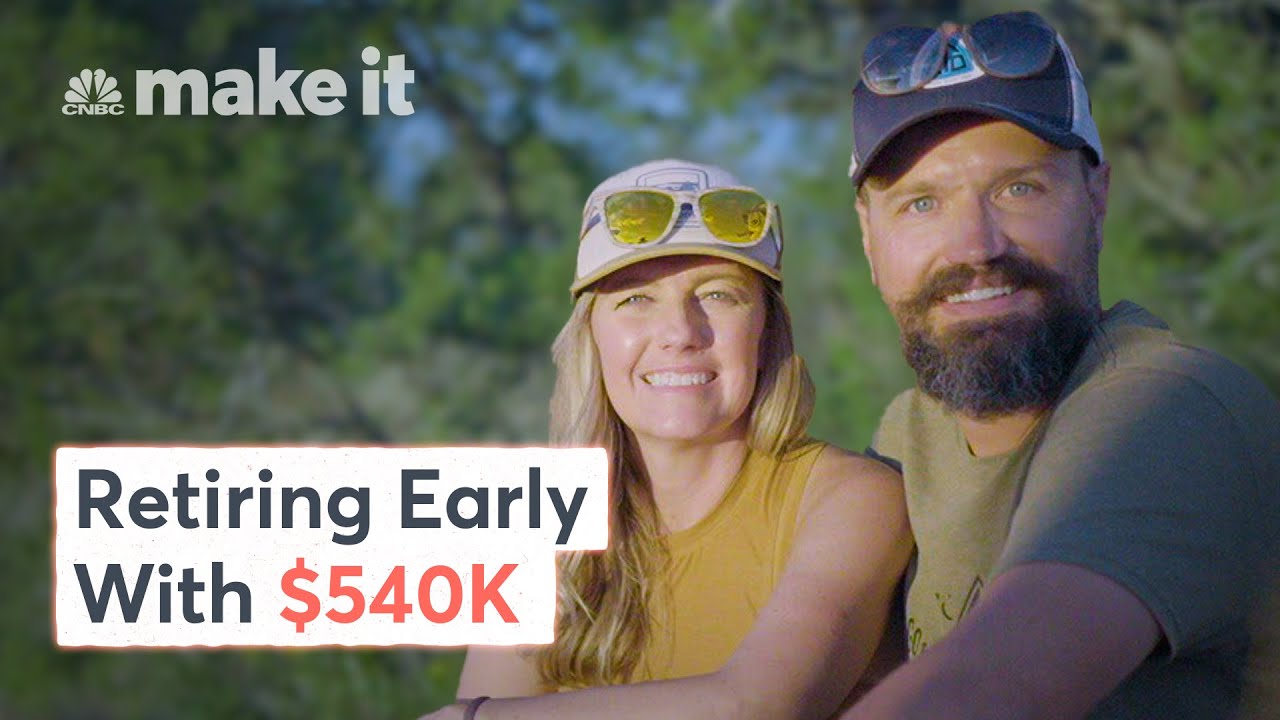
How We Retired Early With $540K At 40 In Colorado
Jason 0 Comments Retire Wealthy Retirement Planning Tips for Retiree's
I started getting
diagnosed with some fairly serious medical
ailments. I just began to realize
that I had been working for a retirement that I
may never enjoy. We just knew we wanted
the freedom to make our own choices with our
time. And that's where
financial independence came in. Then it turned
into how fast can we do this? Let's get it done
as fast as we can. We started to accumulate
real estate in the vein of let's have an
additional source of income besides my job. We accumulated 19 units
over the span of just from 2016 to 2019. I'm Debbie and I'm Chris. We are 43 and live in
Colorado and retired by the age of 40. I never wanted to be a
millionaire. That was never a goal,
even, you know, now in my forties, I just wanted
to have enough money to be able to pay my bills. When I was 21, 22,
somewhere in there, I remember reading The
Millionaire Next Door. It was eye opening to me
because the stories they highlighted in that book
were very similar to what we do. Once it became in
that realm of reality that I could maybe be a
millionaire, then I did become fascinated with
the idea of being a millionaire in both
healthy and unhealthy ways.
Once Debbie left her
job, we're now completely dependent on my job. Honestly, like, I'm sure
there was more than this, but I tell the story
that basically I just stopped going to Subway. Obviously, that's not
the whole case, but that's all it really
felt like. Once we started tracking
our spending a little bit better with budgeting, I
was the guy that was always trying to turn
the knob down on our spending. Chris used to think it
was fun to like try to spend $100 a month on
groceries and just eat what came out of the
pantry.
So we both kind of had
this thought, what if you want to leave your job
someday? That thought easily
turned into how can we use our money to buy us
more time? I was mainly hearing a
lot of stories about rental real estate. Some people were were
building mega empires with rental real estate.
I wasn't looking to do that. I just wanted to
have additional income. And in the in the
process of going from we don't know anything
about being landlords and real estate owners to
let's buy our first property, I scoured the
Internet and spent a lot of time listening to
podcasts, watching YouTube videos, reading
blogs and forums.
And we got this like
eight and a half by eleven vision board type
of thing. So it was just something
that we could write on with chalk that we had
in our kitchen that would remind us of our goals. And, and as I was
writing those goals down, I believe we had like by
the end of 2016, we were going to have two
properties and by the end of 2017 we were going to
have four properties. We were getting
properties that other people didn't want. There was something that
was a bit of an ugly duckling about them. For me, a very difficult
part of this was a lot of elbow grease, fixing up
the ugly things, working on the houses, getting
smoke, smells out, painting everything,
tearing a bunch of flooring out. I'm
spending full days over there. Chris is getting
off work. He's spending nights and
weekends over at these rental properties to get
them ready for tenants and make them nice
places to live.
And as we were doing
that, I'm still saving 50 to 60% of our income
through my paycheck. All the extra money we
weren't spending out of your paycheck was going
toward buying more rental homes. All of the cash
flow we were getting from rentals was going toward
buying more rental homes. We accumulated 19 units
over the span of just from 2016 to 2019.

So it was a pretty
pretty fast and furious four years. We actually ended up
reaching fire at least three years earlier than
we had projected. So gross income from our
rental properties can vary based on vacancy,
capital expenditure, rehab, repairs, those
kinds of things. But it is between 8 to
10000 per month and our net income from our
rental properties is between 4 to 6000 a
month. So the money we live off
of comes purely from our real estate investments. We do have mortgages on
all of our rental properties that we
consider business debt. Our tenants pay those
mortgages for us essentially, and rents
continue to rise as they do so as the mortgage
goes down. Right now, our
investments look like we have about $350,000 in a
combination of traditional IRAs and
Roth IRAs and a brokerage account, $35,000 set
aside in a 529 account for our girls and
another $20,000 in bonds.
The insurance that she
sells for one month a year provides that extra
cushion of safety or comfort, as well as some
other discretionary spending. Our budget now
in FIRE, it looks very similar to what it was
pre FIRE in that none of our categories really
went any different direction except for
travel. We usually have about
$10,000 in our travel budget over the course
of any time, and it's more than we spend. Instead of having a job
where I would work 48 weeks a year and have
four weeks off, I would say now that I work
probably four weeks a year and have 48 weeks
off.
And we found in our lives
that meaning and purpose are important to our
emotional and physical health. And part of that
is around work. We are really enjoying
having this freedom of time to make
connections, to travel and explore. Our
daughters are getting older whether we like it
or not. They'll be graduating
and I'm excited to be a part of of their lives
as they move forward into their next chapters and
have the abundance of time to be able to be in
their lives as much as they will allow us or as
much as as feels comfortable.
I think when we were
searching for financial independence, what we
wanted was freedom and independence from having
to go to a place and do with things someone else
told us to do. And we still want that
and we value that. But I think what we
found through it is a much deeper, fuller,
richer life..
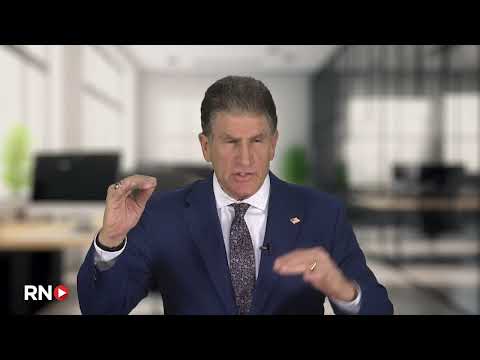
Tim Tremblay of Tremblay Financial Services Discusses Interest Rates
Jason 0 Comments Career after Retirement Retirement Planning
[Music] higher interest rates may be bad for financing a home but there is a silver lining the most challenging part of investing and retirement planning has always been balancing asset growth with asset protection to protect assets we typically need to lower Market risk and to achieve growth we need to increase risk now with higher interest rates we can actually do both there are solutions positioned in ways we haven't seen before joining me to talk about this is my guest Tim trembl with tremble Financial Services in Santa Barbara California uh Tim let's start out with these strategies how do these things work well you know it's it's interesting I had a client come in and talk to me about this investment that's in the market but there's no risk on the downside and I said you know that doesn't sound right you better bring that in so I can take a look at it so he brought in a fixed indexed annuity with Life USA and as I looked at it I thought this is a great idea they're using call options to get Market driven returns with no risk on the downside and that was almost 26 years ago and since that day we've been using fixed indexed annuities as the foundation for our asset allocation for our clients at Tremblay financial and it's real simple how it works it's with a call option there are two types of options puts in calls the option Market is a huge Market you have options on stocks on Futures on indices and what the financial services companies the insurance companies are doing they're just looking at a call option on the market and so with this investment it can only go sideways or up never down and what I like to do when I show my clients how this works is is look at the worst 10-year period that we've seen in the market since the Great Depression we call it the L decade and that would be 2000 to 2010 if you got into the S&P 500 Blue Chip stocks at the at the beginning of that decade in 2000 we were at a record high the dots had just brought us up there and then over the next 3 years we saw the Melt down to the Dooms we saw 911 Afghanistan Iraq if you had $100,000 in Blue Chip stocks at that time three years later you'd have 51,000 and then over the next four years we saw the market go up very nicely fueled by collateralized mortgage obligations which had a risk that we really weren't aware of at that time and we saw the market go back to a record high just a little higher than where we were in 2000 and of course the Great Recession took place at that time we saw if you had a $100,000 in Blue Chip stocks in 2008 a year later you lost 60% of your portfolio small caps NASDAQ other indices and and positions were even more dramatic and then it came back but at the end of that 10-year period from 2000 to 2010 in Blue Chip stocks you would have been down down 20% now with fixed indexed we are very grateful to have that as a foundation for our clients those first three years as we saw a 50% decline you didn't lose a dime and then you don't have to make up losses with a fixed index and as the market moved up over the next four years our call options took us to a 40% profit 2008 then of course when the Great Recession hit you saw the markets decline dramatically we stayed at that 40% profit through the rest of that decade so as you look at all the other asset classes during the worst 10 years that we've seen since the Great Depression the fixed indexed annuity was the best performing asset that we had and we can use the word safe with it and you know Scott I think that's what I like to show folks if you show folks how the markets have done when when things are going great just about anything is going to look good but how does your investment look when you're going through one of the most difficult times that we've had since the Great Depression so is this a good time to consider maybe refinancing an existing annuity you know it it absolutely is Scott when we look at at where these fixed index annuities have gone over the past 25 years there's been dramatic changes those early life USA policies in order to get the profits that you had with those Investments you had to annuitize over 10 years that's no longer the case the liquidity was 5% per a 5-year period and you had to hold it for 10 so you didn't have the liquidity today we have fiveyear 7year 10year in fixed index annuities and you don't have to annuitize they contracts they're they're much better we have a whole wide range of indices that we can choose from from your participation with higher interest rates will be better today than what we've seen in the past so to answer your question today is the best time that we've seen in the past 25 years to be looking at fixed indexed annuities and and if you're out of surrender with an old annuity it might be a variable annuity and you've heard a lot of bad press on variable annuities uh they have management fees from the insurance company the underlying mutual funds have management fees you have risk a principle with the variable annuities so that isn't for all people and you have to understand there's a risk the fixed annuities based on interest rates we haven't seen a decent interest rate in 15 years and we've just seen short-term rates come up long-term rates we have this inverted yield curve are still not looking good for us so the fixed indexed annuity continues to be in our opinion one of the best or the best place for your safe money in your asset allocation and it's important to look at what you have now in the annuity Arena and seeing if we can improve that and put you in a much better position and for someone considering the purchase of a fixed index annuity what question should they be asking well it's important that you understand that it's a long-term investment most of them are longer term uh the shorter term ones won't give us quite the return that you will see with the longer term fixed index you have to understand the liquidity that you have with those fix fixed indexed annuities and then it's important to look at how can you get your return what kind of index is going to be available to you as an investor and and the company that you're working with is so important it's not just the return but the service that you receive from these insurance companies is so important so there's a number of different aspects that are very important for investors to look at as they begin their Journey with a fixed index or continue it in a better way uh and it's something we take a lot of pride in at tremble Financial we're going to help our clients not only have the asset allocation to get them where they want to be in in retirement but when you look at each of the individual Investments That We're choosing for that asset allocation we're going to find the very best one for you that's Tim tremble in Santa Barbara California thanks for watching retirement News [Music] online
Read More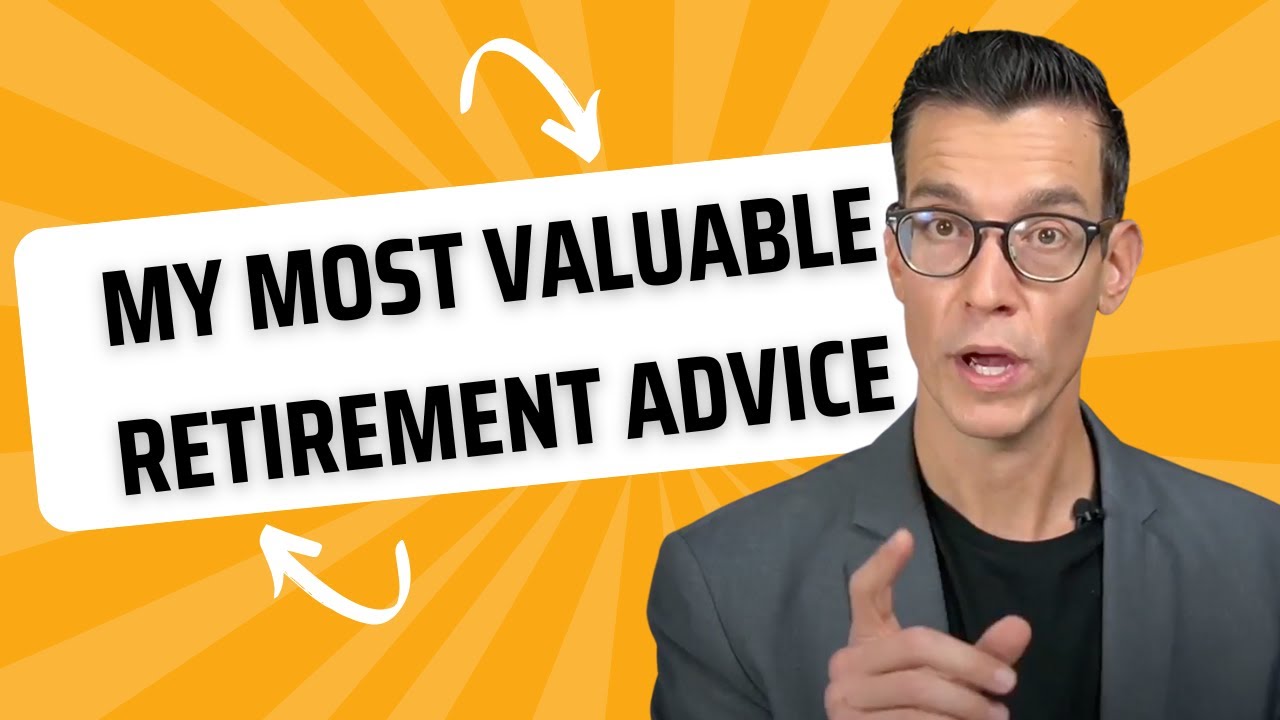
Why Some Retirees Succeed and Others Live in Worry – 5 Retirement Truths
Jason 0 Comments Retire Wealthy Retirement Planning Tips for Retiree's
I want to share one of the most valuable pieces of retirement advice that I've ever heard if you're thinking about your retirement and you're wondering if you're doing the right thing or think that you should be doing something different or if you're just worried about all the things going on right now whether it's the economy or the markets or the value of your accounts be sure to watch this video because I'm going to share the retirement truths that every retiree goes through and it's these things right here we're going to cover today and every retiree goes through it and it they experience this in retirement so it's going to go over this and then also what to expect in retirement and then how to give yourself the best chances of maintaining your lifestyle in retirement as well now the negative of these retirement truths that we're going to look at is that many of them lead to increased uncertainty or worry about your retirement one of our goals though as we're thinking about it is really the opposite of uncertainty or worry in retirement it really should be more about confidence right the next years really all the way up until you pass away wait these are the the magic ears these could be the best years of your life and I know that because there's an actual study a research study uh proving this so let me pull that up really quick and show you the results and I'll link to it below people were asked to score their life satisfaction from zero to ten where 10 is the best possible life and then zero is the worst possible life and this is really just the average score by age and I thought it was encouraging to see that life satisfaction tends to increase as you can see as we get older and then it tends to Trail off as we get older but really the area the the period of time we want to focus on is that this is the magic time and we know this to be true as well because we've helped hundreds of pre-retirees move into retirement with confidence and excitement and these were the people who were coming to us that were feeling somewhat unsure or not 100 confident with their money plan and our firm streamline Financial has been around for 24 years and we've made it through quite a few bad Market periods with our clients and by the way if I haven't met you yet I'm Dave zoller and I own streamline Financial with Tim and Luke and Sean and if you're working with an advisor now that's mainly focused on investments and investment planning but doesn't talk about these key retirement strategies like the tax efficient withdrawal planning and income planning or just tax reduction overall feel free to reach out to us through the website now we don't always have time but I'll get back to you either way so let's get into this first truth in retirement it will be common to have that thought of maybe I should be be making a change or should I be doing something different it'll be normal to feel this way in retirement especially when you see the news or you're listening to friends talk about their finances there's this feeling or this thought of really making us doubt our current plan which causes some people to make more emotional decisions instead of making smart financial decisions and a good way to avoid this is really to avoid this feeling is by having an understanding of your plan which really leads to more confidence with what you're doing and having a plan for both the good times and also the bad Mark of times so that you know that you're prepared for either one of those and I'll give you some ways to achieve this coming up in this video now on to the second thing that comes up in retirement that we just have to be prepared for is we need to expect bear markets right you've most likely lived through a lot of them already and really in retirement though they feel a little bit different usually worse but because of the frequency creating a plan with bear markets in mind and really big Corrections built into the plan is a smart thing to do that way you don't have to worry when they eventually come now if you're not sure how to model out these various what-if scenarios or bad Market scenarios for your plan then you may want to talk to a cfp or check out my favorite retirement income planner below this video you should see a link to it it's one of the best consumer facing planners that I've seen and it doesn't cost thousands of dollars like the ones that we use for our clients the next thing to bring up is for pre-retirees who are close to stopping their wage especially if that's during bad markets they may think should I work a little bit longer maybe just one more year to kind of make it through this this difficult period we actually had a client call us up about five months ago and uh no she was five months into retirement and she said something like it seems like so much bad news is out there and what's going on with the markets I'm wondering if I it would have been better if I should have just kept working so we reviewed her plan and because we built in to her plan this expectation of bad markets everything looked great and and really the only reason to keep working would be if she really enjoyed this sort of work that she was doing and it brought her some some purpose but she didn't so it was great it was great confirmation that she was still on the right track so if this sounds like you take a look at another video I recorded I'm gonna either link on this screen or it'll be below and it gives a few real examples of what working an extra year might look like in a financial plan the next thing to know is that no one really knows what's going to happen next it seems like everybody has a prediction on TV or YouTube or at the dinner table with family or with friends and no one really knows what is definitely going to happen we know this uh in a logical way because you know there's that saying if you put 10 economists in the room together and they come up they need to come up with a conclusion they'll come up with 12 of different answers when they walk out knowing that it's important to prepare your investment plan for that four economic Seasons that we may go through in the future since we don't know which one we're going to go through next so just as as an example you've seen it before the four economic seasons are higher than expected economic growth or lower than expected economic growth and then higher than expected inflation or lower than expected inflation and there's asset classes that can do well in each one of those now again we don't know which way we're headed but having asset classes and each one of those potential Seasons that could be beneficial now that's just my opinion and really it's for all of this talk to your own Financial professionals before doing anything like this now on to the next one which really has more to do with human psychology than investment strategy and then after that I'll share the the really the most helpful piece of advice that I've heard related to retirement planning but if you'd like this so far please click on the the like button and and maybe this video can help somebody else going through the same things that that you're looking forward to so the next truth is in retirement we may have a tendency to compare ourselves to others the grass is always greener on the other side of the fence really throughout life that's we've got that tendency to compare it to others but it can harm us in retirement too if we do a video on this channel that mentions a dollar amount as an example we don't want that to really make you feel better or feel worse about your current situation because you know we help high net worth families at streamline Financial we sometimes mention big numbers but we don't want it to be about the numbers we really want to communicate just the principles and the strategies that can can really be applied to to anybody's finances and there's always going to be people with more than us and then there's always going to be people with less than us and the one who wins is the one who's content and at peace most at peace with their current situation you know that saying if I want to be able to practice being content with a little and I want to be able to practice being content with a lot and and you know healthy competition that's okay but comparing ourselves to someone else because uh you know if it causes us a feel of lack or less than that can hurt our retirement plans because that leads really back to that first point that we talked about in uh in this list of feeling like we should be doing something different for example if we see a guy on the internet and he's investing a certain way or he's deciding he's changing up his entire strategy um because of what's happening with the economy then that may cause us to feel like we should be doing something different and then start to increase the emotional level of uh of our decision making instead of staying to strictly logical or financial levels but again it's a normal feeling to feel that worry or fear or anxiety um with what's happening during during current periods but one of the most helpful pieces of advice that I've heard that we can apply to retirement planning is really the difference between those two words fear and anxiety knowing the difference between those two is actually very very helpful as we're planning retirement and talking about money that is if we want to feel better about what we're doing right now when we think about fear and anxiety we might think of them as being the same thing but actually they're completely different things and let me just pull up these two definitions if I can really quickly fear is a caution over a real and present danger and then anxiety is a worry over an imagined future danger now fear if we've got something right in front of us then it's obviously a very helpful tool for us as humans anxiety though is not always a helpful tool as as we're trying to process things partly because these anxieties there's nothing we can do to control or influence them you may have seen this drawing from Carl Richards before about things that matter and then things I can control here's a place to focus and then another way to look at it is we actually sent this to clients not too long ago on a video of what you can't control and what you can control so we can't control the markets and inflation and what they're doing with interest rates or what's happening in the news or the world or tax laws or the elections but a lot of these things actually do relate to things that we can control for instance you know markets are inflation or interest rates your portfolio allocation you can control that you can control when to pay taxes when it's related to in investing you know as we're talking about Roth conversions or the the costs the tax cost tax drag on some of the portfolio and not to get too nerdy about these things but two of the biggest things that we've seen is this idea of not controlling the news but what we can control is news consumption we've seen a big shift with uh some people who instead of someone who wants to consume the news they switch from TV news to reading news where you have a little bit more control of what's coming at you versus TV is just the next thing is coming at you if you know what I mean I don't know if that's if I if I'm explaining that the right way but back to the this video all the things that we mentioned before earlier here um a lot of these can be anxiety-inducing things as well right the severity of a bear Market or not being able to predict what's going to happen next in the world or comparing ourselves and doubting our plan or thinking that we don't have as much as as we wish we had when it comes to to money or the you know what if this happens and what if this happens how is that going to impact my plan and that can lead that sort of thinking can lead to paralysis and really no action being taken but what if you had a plan that was built in to show those different what-if scenarios so instead of the unknown future danger you're able to get more concrete scenarios in the plan as a result that's what I would recommend once you get get it out in the open then it becomes a lot less scary we both know that so either find a great certified financial planner who can show you that and show you the what-if scenarios or check out the the DIY planner or a different planner that helps you put in those what-if scenarios as well so it becomes less scary so don't forget anxiety is it can be the thief of Dreams it takes you away from enjoying the the present moment and it stops you from even taking the right action to make things better in the future because it really just makes you only focused on on the negative as you're you're moving through life that video that I mentioned earlier is called why delaying retirement might not be a good idea if you're pre-retirement and you're thinking you want to work a little bit longer because of what's going on take a look at that one coming up next or below and then I'll see you in the next video take care foreign [Music]


LPL Financial: A Wealth of Options
Jason 0 Comments Retire Wealthy
Your business is as unique as you are. That's why we design customized solutions for advisors and enterprises and offer a range of business models that meet your specific needs, discover a wealth of options at LPL.

.gif)
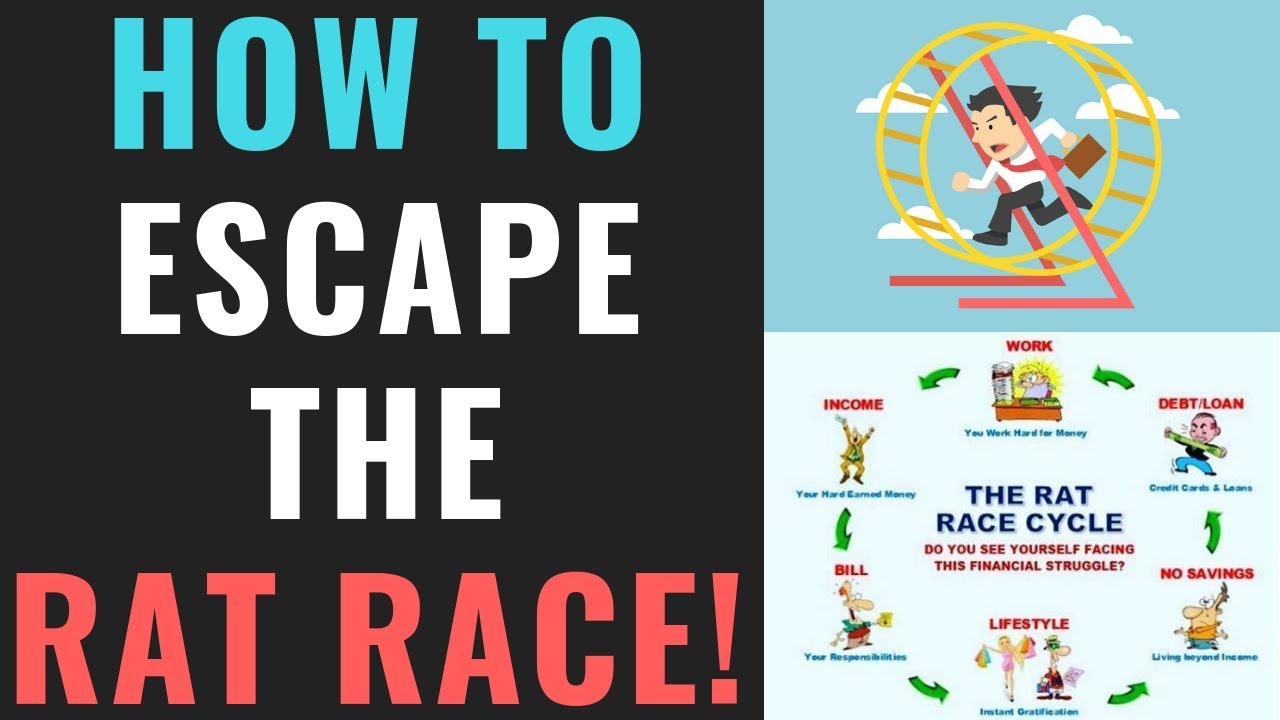

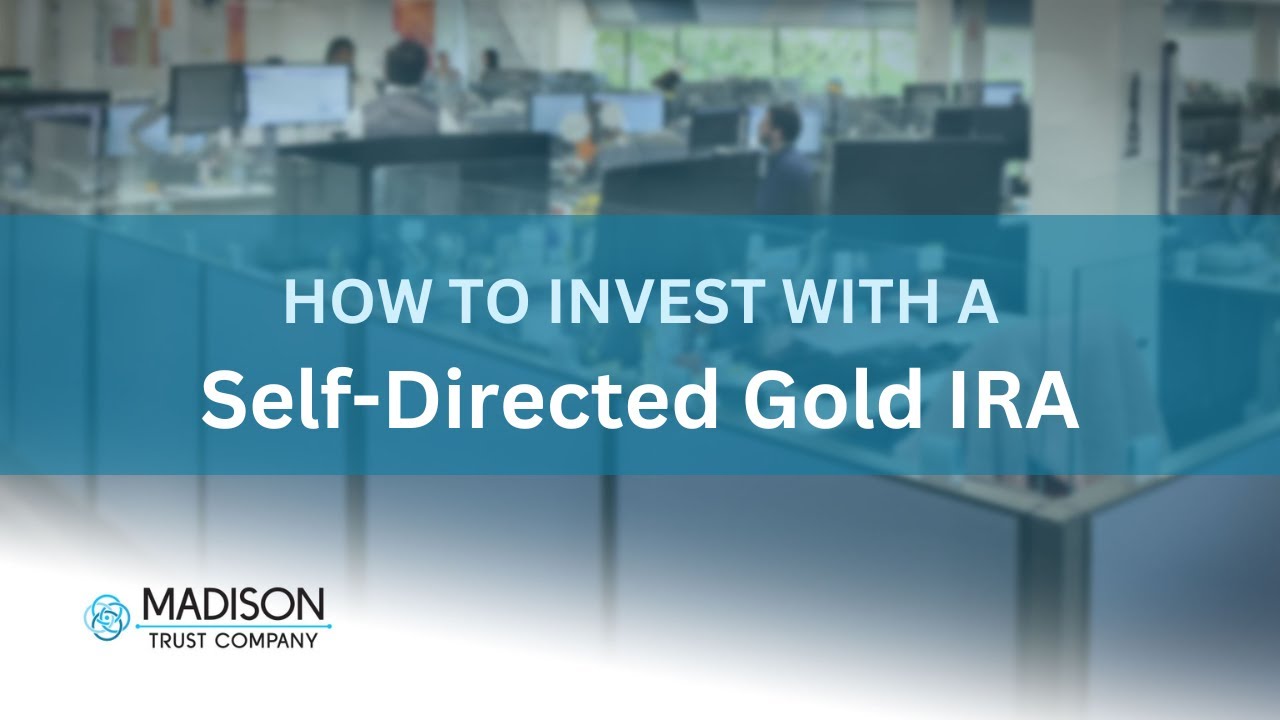




Recent Comments